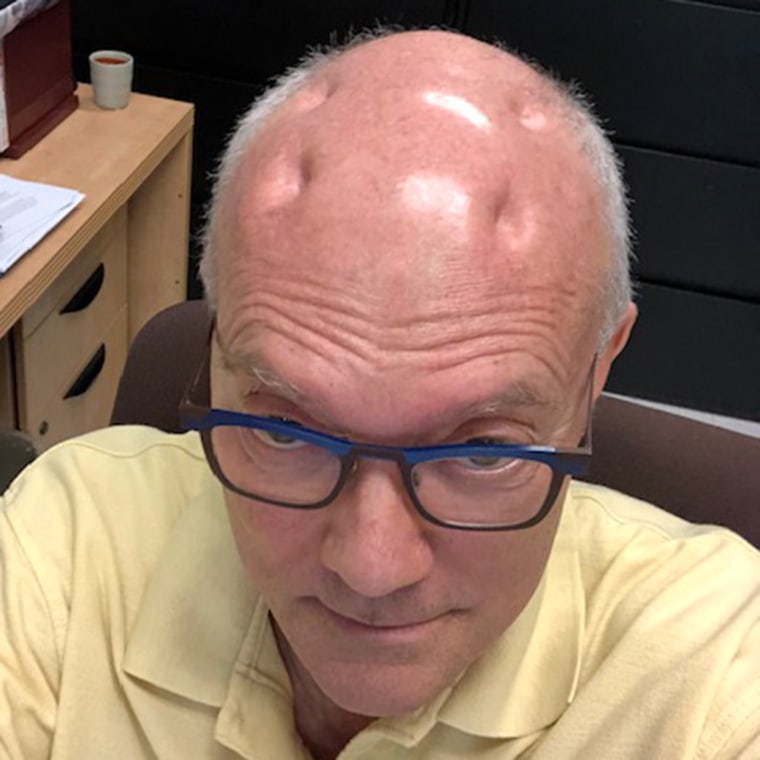A life-threatening brain bleed turned into an eye-opening experience for William Felice.
Emergency surgery left the educator with four distinct dents at the top of his skull, a sudden change in appearance that left him struggling with his self-image and anxious about other people’s reactions.

“When I look at myself, it’s such an odd feeling — you don’t recognize yourself,” Felice, 69, a political science professor at Eckerd College in St. Petersburg, Florida, told TODAY.
“When you think how much we look in the mirror, how many times a day and how much our appearance affects how we feel about ourselves, it just created feelings of insecurity that I hadn’t had before.”
Crushing headaches
The ordeal started last July when Felice, who had enjoyed good health, suddenly began experiencing headaches. He didn’t think anything of them at first, but soon had to turn to over-the-counter medications get relief as his discomfort grew worse.
“It was a feeling of intense pressure that would lead to intense pain. It was like someone was pushing on my brain,” he recalled. “It just wouldn’t go away.”
When the pain became too much in August, he went to the hospital and was immediately taken in for a scan, which revealed bleeding on both sides of his brain.
It wasn’t a stroke and doctors still don’t know what caused the problem, Felice said.
Tissues that surround the brain can tear and bleed if there is a head injury — even a minor one, especially in older adults — and cause a subdural hematoma. Blood then collects between the covering of the brain and the brain surface.
As it builds, the blood pushes up against the skull and has nowhere to go, so it compresses the brain, forcing neurosurgeons to make small holes in the patient’s skull to relieve the pressure, according to Johns Hopkins Medicine. If untreated, the buildup of blood could cause coma and brain damage.
Besides headaches, the symptoms of a subdural hematoma can include slurred speech, balance problems, confusion and loss of consciousness.
Felice ended up with four holes drilled into his skull. The pressure inside was so high that blood squirted out as soon as the doctor made the first opening, he was told after the surgery. Tubes inserted into the holes drained the blood, but Felice suffered two seizures when they were removed.
Luckily, there was no neurological damage and Felice is back to normal, which he called “a miracle.”
'Why does our appearance matter so much?'
Still, the cosmetic aftermath of the surgery endures.
It’s hard for people to not have a reaction to the dents, Felice said. He notices the looks he gets from strangers; while others try to lock eye contact with him, determined not look up at the top of his head.
“I recognize that thousands of other people have experienced disfigurements much worse than mine. This has given me a small understanding of what others have gone through with more serious conditions,” Felice noted.
“Why does our appearance matter so much?” he wondered in an essay published this month in the Tampa Bay Times. Writing about his experience and being open about it has been key to his recovery, Felice told TODAY.
“Our worth as human beings is not determined by our physical appearance and yet society puts so much value on our appearance. It’s helped me to see how superficial that is and to move on.”
The hardest part for Felice was returning to teaching because he was concerned about how he would come across to his students, but they've been "fantastic,” he said.
Felice will have more tests next month to try to figure out what caused the brain bleed. He has to avoid hitting his head and doctors told him to immediately go to the emergency room if he experiences another headache.
Felice is also pondering another surgery that would smooth out the dents in his skull with titanium plates.
Since the ordeal, he’s changed his diet, lost 25 pounds and stopped drinking alcohol to boost his chances of avoiding another brain bleed.
“It’s been pretty easy to make those changes because this whole experience scared me so much,” Felice said.
